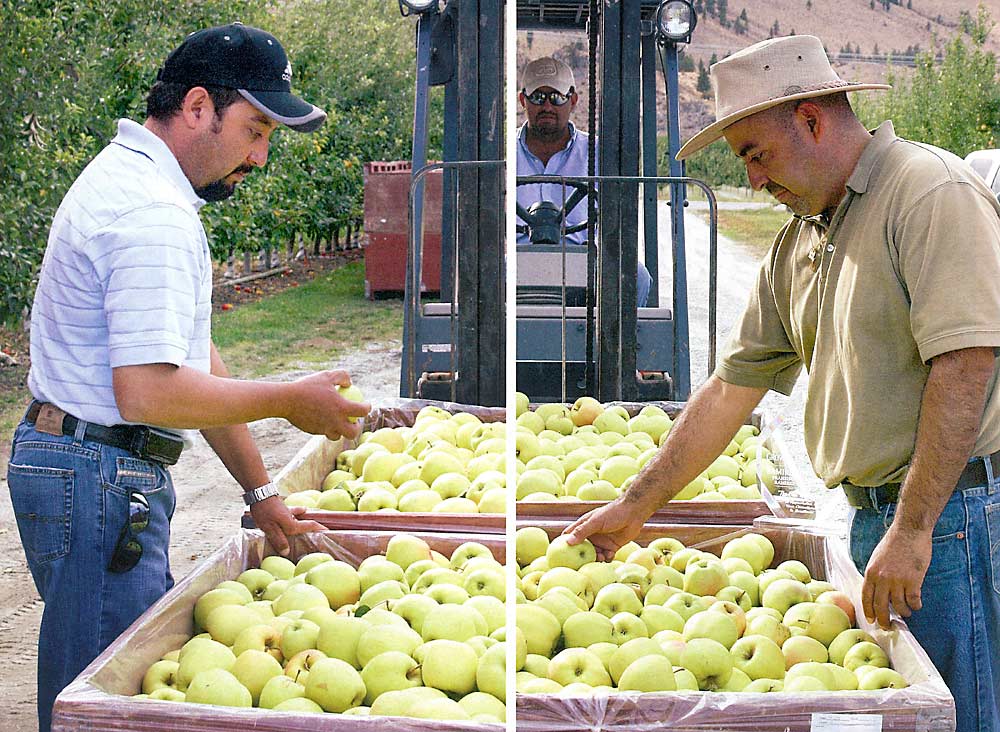
Three years ago, Humberto and Francisco Ramirez knew little about growing cherries, so they were surprised this summer to be named the top late-season cherry growers of 2007 by their packer Stemilt Growers, Inc., Wenatchee, Washington.
The two brothers, both long-time orchard workers, bought an old 12-acre cherry orchard at Howard Flat, Chelan, in 2004. Originally from Michoacán in Mexico, they had started working in the Washington apple industry in 1988 at Cascade Foothills Orchard near Chelan Falls, which was owned by Dr. Don Heinicke.
In 1992, Humberto went to work at Mike Brownfield’s organic orchard at Howard Flat near Chelan and has been there ever since. Francisco still works at Cascade Foothills, which is now owned by Dovex Fruit Company, Wenatchee.
About four years ago, a neighbor of Brownfield’s decided to sell his cherry orchard and asked if Humberto was interested in buying it. It depended on the price, Humberto responded. They continued to negotiate for several months until Humberto felt the price was right. “I called Francisco and said, ‘Do you think we should buy the orchard?’ and I was so glad he said right away, ‘Why not?’
“In the beginning, I was excited,” Humberto recalled.
But their families took some convincing.
“I didn’t want him to get it,” said Humberto’s wife, Leonor. “I’m not a person who likes to take risks, but my husband is a lot different from me. He’s a person who likes to take risks and see what happens.”
Crazy
Friends told the brothers they were crazy because it would be too much worry and too much work. If they needed extra money, why not just get a second job?
But they felt it was too good a deal to pass by and wanted to try working for themselves. They reasoned that even if they lost the occasional cherry crop, the value of the property would increase.
The two kept their full-time orchard jobs and worked at their own orchard in the evenings. Since Brownfield didn’t have cherries, Humberto and other employees were able to take time off during apple thinning to harvest the Ramirez cherry crop. Humberto figured they could hire extra help for pruning. “We were not really afraid of the work.”
After working in organic orchards for 16 years, Humberto had to adjust to conventional farming. He took a course for Hispanic orchardists with consultant Naná Simone, which was a great help, he said. Francisco had learned a lot about pest and disease control while a student in Wenatchee Valley College’s Hispanic Orchard Employee Education Program.
The cherry trees, which had been planted in 1975, were big and unproductive. Following the advice of Stemilt horticulturist Tom Kunkel, the brothers heavily pruned the trees to encourage growth of new fruiting wood.
“Some people, when they saw all the branches on the ground and the employees pruning, said it seems like he doesn’t want any cherries any more,” Humberto recalled. Even he and Francisco thought they might have overdone it when they saw the woodpile.
Paid off
But the rejuvenated orchard produced good crops. In 2007, the 12 acres yielded 90 tons of cherries. That enabled them to pay off the orchard and was the crop that earned them the award for the best quality late-season cherries at Stemilt. This year, because of poor growing conditions, they picked only 50 tons, but high prices compensated for the drop in yield.
“This is probably our best purchase in our life,” Humberto said. “It feels so good working on your own orchard. You don’t have to be afraid of making mistakes.”
So, when a Golden Delicious and Gala apple orchard right across the road from the Brownfield orchard came up for sale in the fall of 2007, the brothers decided to buy that, too. Leonor, who is the bookkeeper, was less worried about buying the apple orchard because of the success they had with the cherries. “I thought, more work, but maybe it’s worth it.”
It’s a conventional orchard, but they hope to convert to organic. After working for Brownfield for so many years, Humberto said he prefers not to handle conventional pesticides.
Timing
Once again, the timing of harvest is good because Brownfield doesn’t have Golden Delicious apples. They can use the same crew, and Brownfield loaned them equipment, such as a forklift and tractor.
They attribute their success as orchardists to others who have helped them, including their friends who have been working at their orchard. Humberto’s philosophy is to treat workers the way he would like to be treated. He provided treats such as donuts and sodas during cherry picking and said if the apple harvest goes well, they can expect a bonus.
Good employees can help make the grower successful, but if they aren’t treated well, they won’t work well or won’t stay, said Humberto, who feels very fortunate to have worked for good people like Heinicke and Brownfield.
“I have great employees, a great fieldman, and a great boss,” he said.

Leave A Comment